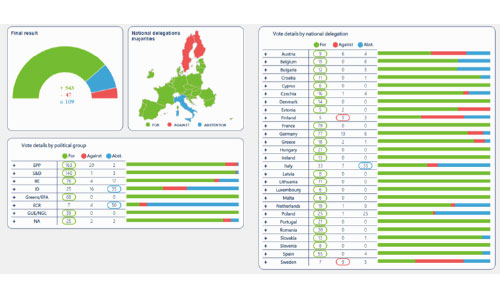An interesting debate is taking place within the European Union about who is competent on forest policy. Member States and a few Members of European Parliament (MEPs) argue that the preparation and implementation of the EU post 2020 Forest Strategy falls under national competence. For example, Ms Petri Sarvamaa – Finnish MEP – initiated a European Parliament report entitled the European Forest Strategy – The Way Forward (2019/2157(INI))[1]. The document in its current form (to be voted on the plenary on 6 October 2020) even includes the following:
The European Parliament “(t)akes the view that the EU Forest Strategy should act as a bridge between national forest and agroforest policies and EU objectives relating to forests and agroforests, recognising both the need to respect national competence and the need to contribute to wider EU objectives”
On the other hand, the European Commission and some other MEPs are of the opinion that the competence for forests is shared between the Member States and the European Commission. Mr Frans Timmermans in his letter to Mr. Hubert Schorlemer, the President of CEPF, highlighted that “the EU has a range of competences that may related to forests such as climate, Environment, rural development.” His letter then added that “(w)ithin these areas of shared EU competences, forests and forestry certainly do not fall exclusively within the competency of Member States”. His statement included a clear reference to a judgment of the Court of Justice of the European Union in 1999, which recognised EU competence on for instance environmental actions in forests based on in Article 191 of the Treaty.
The EP adopted the report on the EU’s role in protecting and restoring the world’s forests on 16 September 2020[2], which with an overwhelming majority supports Timmermans’ position. In its Article 2) the report “(s)tresses the need to recognise the EU’s competences, responsibility and funds available in the area of forest protection, including European forests as part of the world’s forests, in the framework of EU environmental policy”. The message is clear, but – noting the upcoming plenary vote on Petri Sarvamaa’s report – the discussion is not over!
Interestingly the fault line of discussion in the European Parliament does not seem to be between parties[3], but the sides represent geographical and eventually economic divide (see inserted figure about the voting result on 16 September 2020). It is not surprising that the majority of Swedish and Finnish MEPs, supported by a strong group of Austrian and German MEPs seems to strongly argue for Member State competence over “forest”. These are the countries where forestry and timber industry are strong, which clearly indicates the driver behind the debate.

Voting results showing divided geographically
The discussion is fuelled simply by (a) mixing terminologies and (b) falsely pretending that a particular group of experts – in this case foresters – has overriding responsibility (and competence) for forests.
Mixing up the term of forest and forestry is completely wrong. Forests have indeed various roles, benefits to society. The benefits with a very strong anthropocentric approach, usually described as ecosystem services. These includes 4 main categories: supporting, provisional, regulating and cultural services[4]. The production of timber, as a way to provide wood, fibre, pulp to the society is only one of the benefits provided under the category of provisional services. However, the totality of ecosystem services includes clean water (provisional), biodiversity and soil formation (supporting), carbon storage and flood control (regulating), recreation and education (cultural) benefits. Some of these services are much higher in case of forests that are not managed for maximising timber production. So, while forestry as an economic, production activity lies indeed as a competence on Member State level, forests which provide multiple benefits is certainly not!
That leads me to the second discussion point: the role of foresters. These professionals might indeed the best experts of running a profitable, and hopefully sustainable forest management, but there are other experts whose responsibility over forest must be recognised. Ecologists, landscape planners, biologist, rangers, etc…These professions must also be recognised now as experts over forests as a habitat type!
One of the arguments which is used in Petri Sarvamaa’s report for forestry, hiding behind bioeconomy, is an economic point: “Every euro invested in bioeconomy research and innovation under Horizon 2020 will generate about EUR 10 in added value”. This should not be an argument for designating forests across Europe for forestry (timber harvesting). I am sure Mr. Sarvamaa is aware of the report of the Finnish Forestry and Park Service, Metsahallitus[5], which come up with the following conclusions: “National Parks Return 10 Euros to the Finnish Economy for Every Euro Invested by the Finnish Taxpayer”.
In other words: protection of forests and other natural habitats presents huge potentials for being a very profitable “business” of our economy, provided that a plan is put in place
It is time to recognise that the protection and conservation of Forests can provide huge economic revenues, if correctly and ecologically utilised, and that the loss of forests means instead a dramatic loss of money – and that is forever!
[1] https://oeil.secure.europarl.europa.eu/oeil/popups/ficheprocedure.do?lang=en&reference=2019/2157(INI)
[2][2] https://www.europarl.europa.eu/doceo/document/TA-9-2020-0212_EN.html
[3] https://www.maaseuduntulevaisuus.fi/metsa/artikkeli-1.1198386?fbclid=IwAR1skrS3-pyZ6M29ZY8Vovfwjk1IJTqk1AFl4dbmKPMp4kSxD-QSFdU4Ikw
[4] https://www.researchgate.net/figure/Four-categories-of-ecosystem-services-as-classified-by-the-Millennium-Ecosystem_fig1_316122119
[5] https://www.metsa.fi/en/economic-benefits-of-national-parks/

Recent Comments